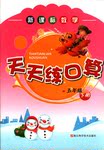题目内容
【题目】
In 1931, I was born disabled. I couldn’t 【1】(straight) my legs. Dad would carry me when we went into town. Once 【2】he was holding me, I told him I wanted to be a football player. He said, “I don’t think you are going to be much of【3】unique athlete.” This was my motivation for years【4】 (come). I had outgrown(因长大而不再)my disability by the time I was 9, 【5】I weighed only 40 pounds and needed to build muscle and strength.
I knew that a bicycle would help. I bought【6】at the local shop and started riding it to school. By the time I was 13, I【7】(become) the fastest runner in grade school, and at 15, I was the fastest runner in high school.
I made farmwork a part of my recovering routine. I 【8】work in the fields at 7:30 p. m. and then run two miles. Picking up wheat was a big thing but I did it all by hand. Finally, all the trainings【9】off and now I am working as a public speech maker giving courses【10】disability recovering.
【答案】
【1】straighten
【2】when
【3】a
【4】to come
【5】but
【6】one
【7】had become
【8】would
【9】paid
【10】on
【解析】这是一篇记叙文,作者讲述了自己通过艰苦的训练和努力最终取得成功的故事。
【1】情态动词后要用动词,故填straighten。
【2】此处表示时间,当他扶着我时。
【3】a unique athlete一个独特的运动员。athlete是可数名词,所以前面需要加冠词,unique第一个音为辅音,所以用a。
【4】用动词不定式to come表示将来,修饰前面的years。
【5】这里表示转折,我9岁时不再残疾,但是我只有40磅,还需要锻炼肌肉和力量。故用but。
【6】用one代替前面出现的a bicycle。我买了一辆自行车。
【7】by the time引导的时间状语从句用过去时,主句用过去完成时。
【8】would表示过去的习惯性动作,表示过去常常。
【9】pay off得到回报。这篇文章讲述的是过去的事情,所以用过去时。
【10】关于残疾康复的课程。用介词on表示“关于”。

 天天练口算系列答案
天天练口算系列答案